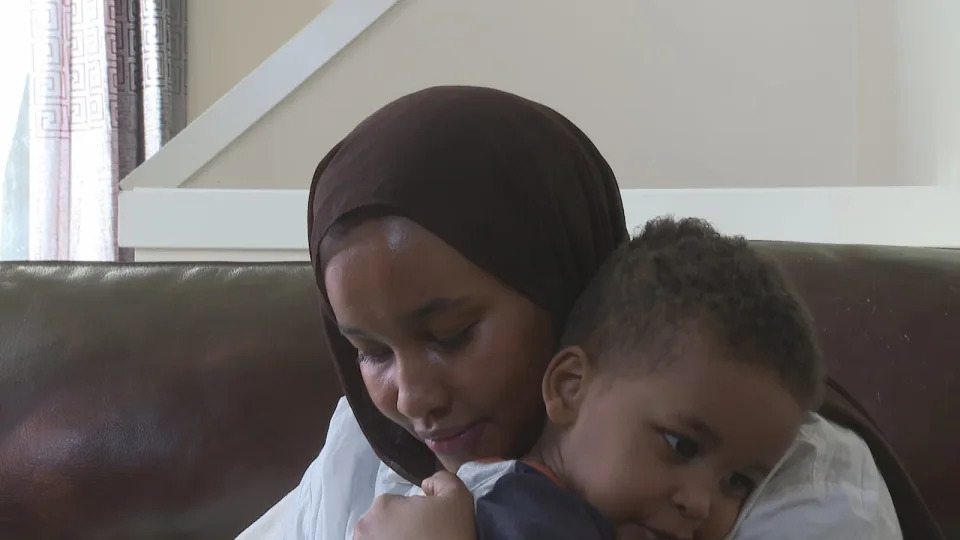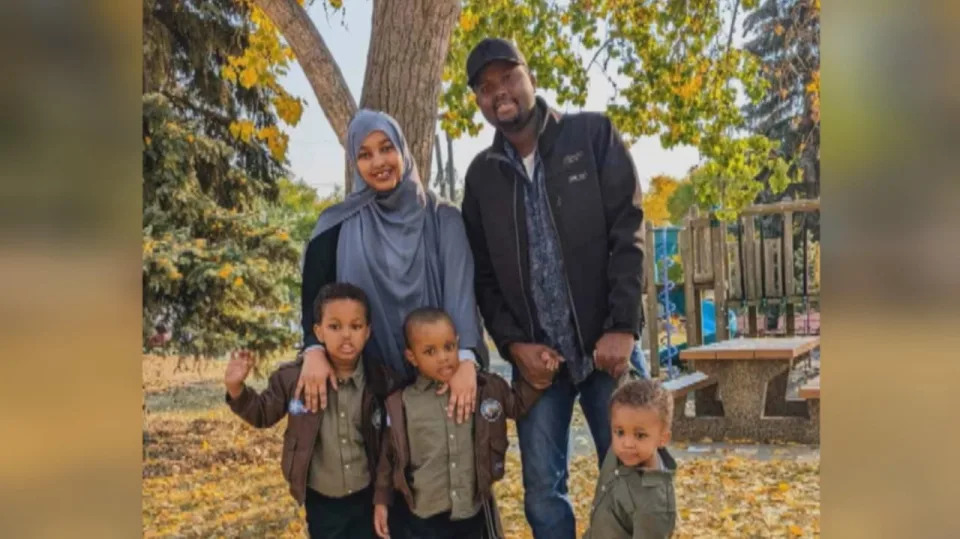CBC
Sat, November 18, 2023

Halima Abdi and her youngest son, two-year-old Mubarak.
(Travis McEwan/CBC News - image credit)
For 15 long months, Edmontonian Halima Abdi fought to stay in Canada with her husband and three Canadian children.
She even went into hiding after a warrant was issued for her arrest.
Edmonton police finally caught up with Abdi in October 2022. She was arrested, briefly detained and issued a one-way ticket back to Kenya on Nov. 14th.
But Abdi never boarded the flight. Hours before take-off, a border agent called. Her removal had been cancelled.
"I was so relieved," said Abdi, 33, through smiles and tears, from her Clareview home with her sons sticking close to her side. "It was a miracle."
Abdi's journey to Canada began nearly seven years earlier when she fled extra-judicial killings of ethnic Somalis in her native Kenya, which she says claimed the life of her brother.
Canadian immigration authorities concluded Abdi's life was not at risk and rejected her refugee claim.
'Don't leave me mummy'
Of greater concern to Abdi however, was the impact her absence would have on her three sons aged two, four and five. Nearly a year after coming out of hiding, she says stepping out of the room can still set off her oldest boy.
"He's like 'where are you going mummy, don't leave me mummy'," Abdi said.
Abdi's plight drew the lobbying efforts of community and business leaders as well as the Canadian Academy of Child & Adolescent Psychiatry.
The Academy warned the federal government's approach to removal is putting the mental health of Canadian children at risk.

Halima Abdi saw her husband and sons for the first time in three months last week after she went into hiding to avoid deportation. Halima Abdi and her family in October 2023 when she came out of hiding to speak to CBC News. (Dunia Nur)
In an emailed statement, the Canadian Border Services Agency (CBSA) confirmed Abdi's removal was cancelled "after the issuance of a temporary resident permit and a work permit were authorized, ensuring she can continue to stay in the country for a period of two years, and allowing for the processing of her pending application."
The reprieve gives Abdi an opportunity to apply for permanent residency on humanitarian and compassionate grounds.
The CBSA did not address several questions posed by CBC News including whether this is a stand-alone decision or a shift in policy. The agency does not track how many Canadian children are affected by such removals.
Dunia Nur, president of the African Canadian Civic Engagement Council, said this week's decision gives her hope for other cases.
"But what scares me is there is nothing that is mandated so therefore it's the discretion of whoever is in power and to what extent they're willing to intervene," said Nur, who led advocacy efforts for Abdi.
While Abdi's dream of settling in Canada for good no longer seems out of reach, she hopes her experience can help other families in similar circumstances.
"Since Canada's main goal is to unite families — I'm begging the Canadian government not to separate families."
For 15 long months, Edmontonian Halima Abdi fought to stay in Canada with her husband and three Canadian children.
She even went into hiding after a warrant was issued for her arrest.
Edmonton police finally caught up with Abdi in October 2022. She was arrested, briefly detained and issued a one-way ticket back to Kenya on Nov. 14th.
But Abdi never boarded the flight. Hours before take-off, a border agent called. Her removal had been cancelled.
"I was so relieved," said Abdi, 33, through smiles and tears, from her Clareview home with her sons sticking close to her side. "It was a miracle."
Abdi's journey to Canada began nearly seven years earlier when she fled extra-judicial killings of ethnic Somalis in her native Kenya, which she says claimed the life of her brother.
Canadian immigration authorities concluded Abdi's life was not at risk and rejected her refugee claim.
'Don't leave me mummy'
Of greater concern to Abdi however, was the impact her absence would have on her three sons aged two, four and five. Nearly a year after coming out of hiding, she says stepping out of the room can still set off her oldest boy.
"He's like 'where are you going mummy, don't leave me mummy'," Abdi said.
Abdi's plight drew the lobbying efforts of community and business leaders as well as the Canadian Academy of Child & Adolescent Psychiatry.
The Academy warned the federal government's approach to removal is putting the mental health of Canadian children at risk.

Halima Abdi saw her husband and sons for the first time in three months last week after she went into hiding to avoid deportation. Halima Abdi and her family in October 2023 when she came out of hiding to speak to CBC News. (Dunia Nur)
In an emailed statement, the Canadian Border Services Agency (CBSA) confirmed Abdi's removal was cancelled "after the issuance of a temporary resident permit and a work permit were authorized, ensuring she can continue to stay in the country for a period of two years, and allowing for the processing of her pending application."
The reprieve gives Abdi an opportunity to apply for permanent residency on humanitarian and compassionate grounds.
The CBSA did not address several questions posed by CBC News including whether this is a stand-alone decision or a shift in policy. The agency does not track how many Canadian children are affected by such removals.
Dunia Nur, president of the African Canadian Civic Engagement Council, said this week's decision gives her hope for other cases.
"But what scares me is there is nothing that is mandated so therefore it's the discretion of whoever is in power and to what extent they're willing to intervene," said Nur, who led advocacy efforts for Abdi.
While Abdi's dream of settling in Canada for good no longer seems out of reach, she hopes her experience can help other families in similar circumstances.
"Since Canada's main goal is to unite families — I'm begging the Canadian government not to separate families."
No comments:
Post a Comment